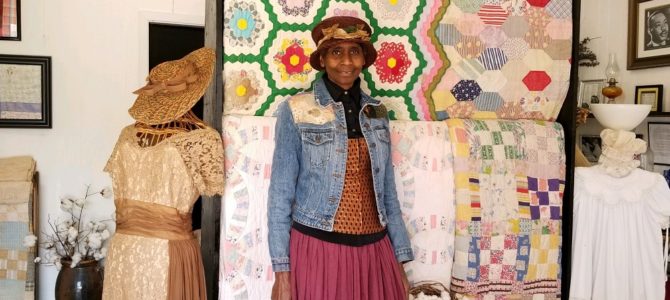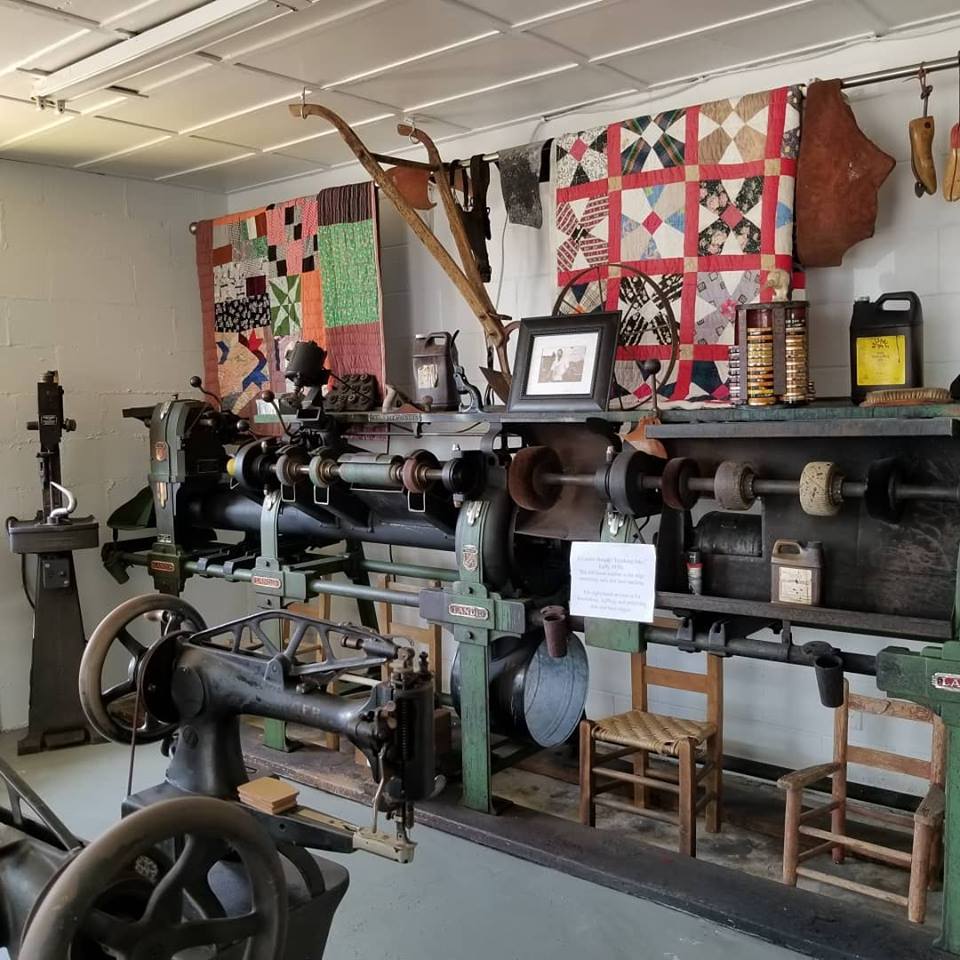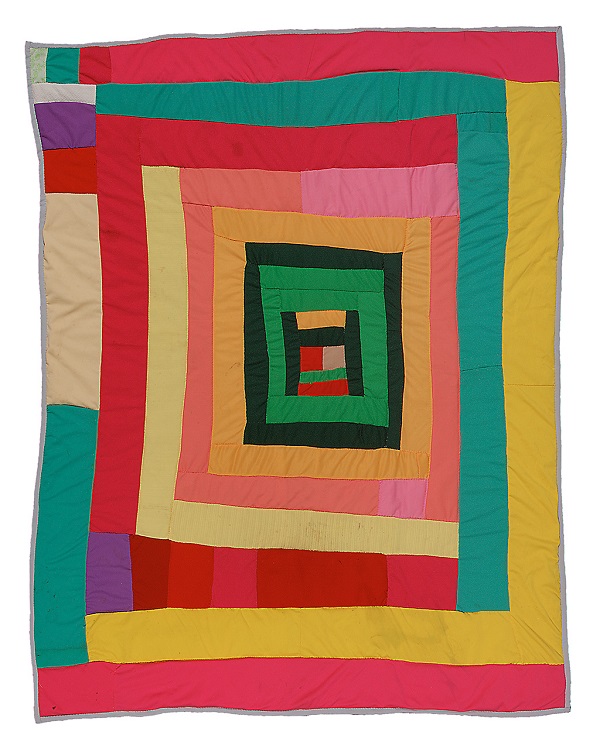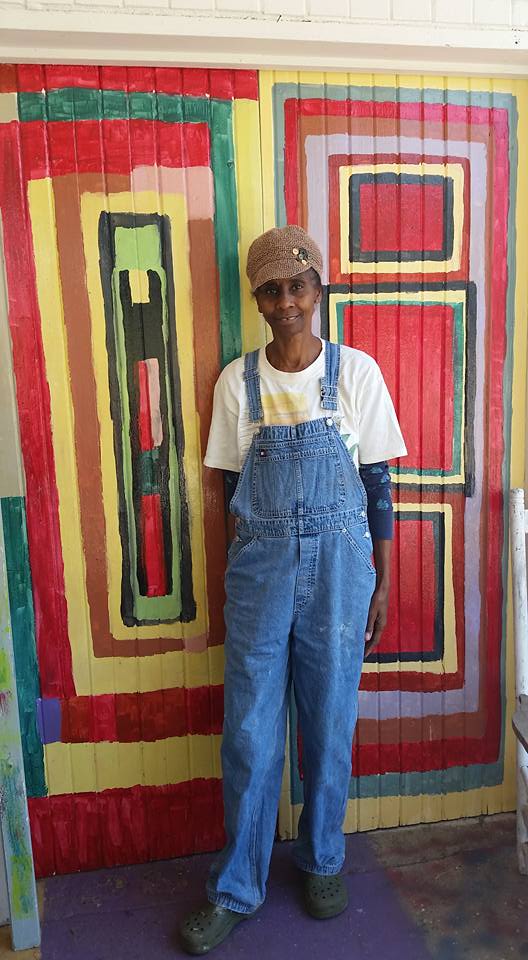
For Betty Anderson, the oldest national commemoration of the end of slavery, Juneteenth, is profoundly personal. Anderson traces her family back into slavery and knows their names: Isaac and Vina Pettway, her great-great grandparents born in 1840s, and their eight children, three of whom, including her great grandfather Stamper Pettway, also were born into slavery.
In 1846, Isaac and Vina’s parents arrived in Alabama after walking 700 miles with 98 other slaves from their owner Mike Pettway’s plantation in North Carolina to the Alabama plantation he was given to pay off a debt. The 4,000-acre cotton plantation, founded by Joseph Gee in 1816, was located on an isolated triple turn of the Alabama River, known as “Gee’s Bend.” Pettway gave every slave—his and the 47 that “came with” the plantation—the name Pettway.
Anderson lives about 9 miles from Gee’s Bend, as the crow flies and the ferry runs, in Camden, the Wilcox County seat, where she runs The Old Shoe Shop museum, featuring the contributions of African Americans, including her family, to the Black Belt and the nation.

“To me, it’s very important to teach our children about our people and their stories,” said Anderson, 69. “I have always loved listening to the stories from ‘old times,’ and I am proud of all my family has accomplished despite coming out of the horrible sin of slavery.”
A Vibrant Life Amid Darkness
At the museum, Anderson celebrates her family’s many accomplishments as war veterans, truck farmers, land and business owners, weavers of fabric for the FDR White House, civil rights activists, and Gee’s Bend quilters. Her aunt Minnie Sue Coleman’s vibrant “Pig in a Pen” was one of ten Gee’s Bend quilts to appear on a U.S. postage stamp in 2006.


She’s dedicated to telling and showing the history of her community that is too often left out of textbooks, she said. She brings the same commitment to Juneteenth, which commemorates the day—June 19, 1865—that Union Gen. Gordon Granger arrived in Galveston, Texas and proclaimed all slaves free “in accordance with a proclamation from the Executive of the United States”
Texas and its 250,000 slaves were the last to learn about the South’s defeat and the end of the Civil War, as they were the last to learn of the emancipation of slaves of the South that had become law two and a half years earlier. Ex-slave Hazel Smith of Hempstead, Texas remembers as a child standing on the fence of their master’s home watching Union soldiers, including black soldiers, pass by on horses announcing the news: “They played the prettiest, prettiest music you ever heard in your life. And the soldiers would, you know, they’d sing, you know. And them horses dart and follow the music just like that.”
The Origins of Juneteenth
City fathers often refused the use of public parks to celebrate the event. Leaders of the movement raised their own funds and bought land for it, naming the sites Emancipation Park. In Houston, a pastor raised $1000 for a 10-acre site in 1872, and in Austin the Travis County Emancipation Celebration Association acquired land for its Emancipation Park in the early 1900s.
On January 1, 1980, Texas was the first state to name Juneteenth as a state holiday through the efforts of Al Edwards, an African-American state legislator from Houston. Since then, most states observe Juneteenth (June 19) as an official or ceremonial holiday. Alabama was the 40th state to recognize the historical significance of Juneteenth in 2012.
Juneteenth celebrations can be from coast to coast, with some weekends before and after June 19, and many choosing to remember it on June 19, whatever weekday it falls on. Food, music, crafts, parades, rodeos readings, plays, blood drives, health checkups, and voter registration drives are part of the different community celebrations.
This year, Juneteenth also reflects 400 years of enslavement since the English privateer ship, the White Lion, brought the first “20 and odd” enslaved Africans to the continent on August 25, 1619.
Freedom from Slavery Took More than the Civil War
In Camden, Alabama, Anderson single-handedly sponsors this celebration for African American and white friends, family, neighbors, and children from local youth programs. She doesn’t shy from the harsh realities of slavery or life during the Jim Crow era, but focuses on the strength of her people to survive and thrive.
Her program opens with a religious call-and-response from members of a local Baptist Church, followed by the reading of the Texas emancipation proclamation (General Order No. 3). There will be poems, stories about ex-slaves who founded schools in rural Alabama and a dancer portraying Billie Holliday’s song, “Strange Fruit.”
It’s important to include those terrible years after slavery ended, Anderson said, because freedom from slavery did not bring freedom for the African American. That would take another 100 years, when Anderson stood in attendance as Dr. Martin Luther King Jr. came to Camden to speak for the rights of all people in a campaign for voting rights.
Anderson’s celebration features a feast of traditional foods, including barbecue, tea cakes, corn, and red soda, and a quilt-making craft with the children. She will also tenderly show the worn but cherished feed sack quilt sewed by her great-great aunt Emma, born a slave on the Pettway plantation to Isaac and Vina Pettway, the threads tying together the generations of Pettways, Colemans and Andersons who helped build Alabama, celebrating its 200th anniversary this year.

The meaning of the holiday is also profoundly personal to African-American historian Henry Louis Gates Jr. In his PBS show “The African Americans; Many Rivers to Cross” blog, Gates explains the history of Juneteenth and offers his “postscript” on the holiday:
Of all Emancipation Day observances, Juneteenth falls closest to the summer solstice (this Friday, June 21), the longest day of the year, when the sun, at its zenith, defies the darkness in every state, including those once shadowed by slavery. By choosing to celebrate the last place in the South that freedom touched — reflecting the mystical glow of history and lore, memory and myth, as Ralph Ellison evoked in his posthumous novel, Juneteenth — we remember the shining promise of emancipation, along with the bloody path America took by delaying it and deferring fulfillment of those simple, unanticipating words in Gen. Granger’s original order No. 3: that ‘This involves an absolute equality of personal rights and rights of property between former masters and slaves.’
My hope this Juneteenth is that we never forget it.
Juneteenth Celebrations on June 19, 2019 (unless otherwise noted)
In Galveston, Texas, where it all began, there are daylong celebrations beginning with a parade, the re-enactment of the reading of the proclamation, and sharing of stories of African American families, while in Houston there will be activities in African-American founded historic Emancipation Park.
In Dallas, The Martin Luther King Jr. Community Center hosts a free family event, with food, entertainment, arts and crafts, and a health fair.
Brooklyn celebrates African American Freedom Day, also referred to as Juneteenth, at the Brooklyn Jazz Hall of Fame ceremony presented by Central Brooklyn Jazz Consortium in partnership with RestorationART to posthumously induct jazz master Randy Weston into the Hall of Fame. The program’s presentations commemorate both Black Music Month and Juneteenth and include music by the Jazzteenth Freedom Ensemble, Emmanuel Baptist Church Praise Choir, and Shanto’s Drum Procession.
The New Orleans African American Museum of Art, Culture and History will serve as host site of the Juneteenth Jazz Jam and Art Festival from 11:00 a.m. – 6:00 p.m. Other celebrations in the city and state can be found here.
Chicago churches, communities, museums, and African American organizations sponsor Juneteenth festivals with music, food, parades, and more throughout the city through June 29.
Milwaukee hosts one of the largest Juneteenth celebrations in the country, spanning four city blocks with hundreds of vendors and activities, starting with a parade and including the crowning of Miss Juneteenth and Little Miss Juneteenth.
In Montgomery, Alabama, Juneteenth sponsored by the Rosa Parks Museum will be held June 22 and include food and merchant vendors, performances, a children’s area, and free tours of the museum. The band Souled Out will perform with other musicians throughout the day.
Sacramento hosts a recognition of the holiday at the steps of the state capital during the lunch hour, sponsored by California Pan African Heritage. Other activities throughout the state can be found here.
The Smithsonian’s National Museum of African American History and Culture in Washington DC calls Juneteenth “our country’s second independence day.” If you can’t make it to any celebrations, you can go on a virtual tour of the Smithsonian exhibit hosted by the museum’s founding director, Lonnie Bunch III. The Slavery and Freedom exhibition celebrates #Juneteenth, by highlighting stories behind some of their most popular objects, “including Nat Turner’s Bible, freedom papers of free African Americans, and a Sibley tent that housed African Americans who ran from Southern plantations in search of freedom with the Union Army.”









